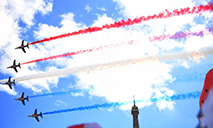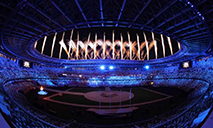Commentary: Inflating China threat won't heal America's infrastructure woes
BEIJING, Aug. 12 (Xinhua) -- The current U.S. administration has been tapping the so-called "China threat" to rally bipartisan support and push forward its domestic and foreign agenda.
For the moment, this tactic to scare up a win seems to be working. On Tuesday, the U.S. Senate passed a roughly 1-trillion-U.S.-dollar bipartisan infrastructure bill after rounds of haggling.
However, demonizing China might help the White House secure a victory in an increasingly anti-China Washington, but is not even remotely enough to heal America's infrastructure woes, whose root causes are within the country's own borders.
If America's decision-makers truly care about their country's fate and fellow Americans' safety, health and future, they should take the passage of the bill not as a moment of celebration, but an opportunity for reflection.
It is ironic that a great power that could complete the construction of the Empire State Building within about 410 days in the 1930s has degenerated into a nation where the building of a local water desalination plant takes more than a decade in the 21st century.
Regarding the urgent need to reverse the situation, most Americans are on the same page. But their representatives in the Congress are more obsessed with playing politics than serving the people. Even a debate on infrastructure in the Congress can last for years or decades, leaving the ordinary people continuing to suffer from tattered roads, bridges, power grids and water pipes.
Although the Senate's passage of the infrastructure bill is touted as a symbol of bipartisan solidarity, it does not offer the suffering Americans a sense of relief, as the bill will face more intense partisan discord and Democrats' inner-party struggle in the House.
Even if the bill is lucky enough to survive the politics and signed into law, few politicians will pay attention to the following implementation. In U.S. history, that is where such stories mostly ended. Piles of laws did not always bring Americans better life.
Another obstacle to improving the infrastructure is fundraising, especially for a financially-strained federal government.
As usual, while Democrats support tax increases, Republicans strongly oppose the idea and tend to encourage more investments from the private sector. However, the private sector has little incentive to join because such investments will not see immediate rewards.
The curtailed scale of Biden's infrastructure bill, compared with his initial proposal, and the prolonged Senate debate on cryptocurrency tax mean finance is still posing a potential threat to the country's upgrading plan.
Meanwhile, red tapes, mainly the widely-criticized environmental review and permitting processes, politicians' inertia resulted from election calculations, as well as the bipartisan system induced policy inconsistency have paralyzed numerous ambitious infrastructure plans and specific construction projects over the past decades.
It is self-evident that these difficulties cannot be overcome by continuing the anti-China talking. Spreading baseless fear of China only demonstrates that the United States is full of anxiety to safeguard its leading position but lacks the ability and courage to solve its true problems.
If U.S. politicians cannot keep their eyes off China, they should learn from China's experience in infrastructure building, instead of scheming how to slow China down.
When Beijing endeavors to improve its infrastructure, all it cares is providing its people with smooth roads, clean drinking water, reliable power supply, faster internet speed, and ultimately, a better life for all.
For Washington politicians, inflating anti-China sentiments will not wipe away the real problems that are preventing them from building a better America. They should start solving these tough problems, or the nearly 3,000-page plan or whatever plan that might follow will stay pitifully on paper.
Photos
Related Stories
- U.S. COVID-19 cases, hospitalizations, deaths continue to rise: CDC director
- U.S. sending troops to Kabul airport to support embassy drawdown
- 'Wuhan lab leak' frame China being bottled by the US
- Truth about America's fight against COVID-19: Power checks and balances become power games
- You can only hear what the U.S. wants you to hear
Copyright © 2021 People's Daily Online. All Rights Reserved.










